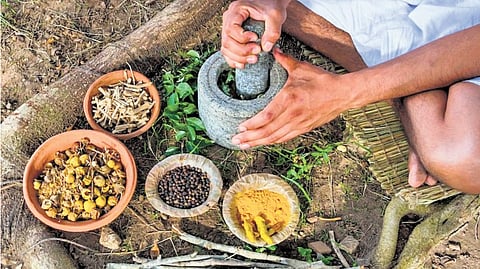

As we marked World Cancer Day on February 4, 2024, with the theme ‘Close the Care Gap’, it has become crucial to reflect on the rising incidence of cancer cases and the comprehensive approach needed for cancer care. This theme underscores the importance of equitable access to cancer care across different societal levels. In this context, the traditional Ayurveda plays a significant role in offering a holistic approach to cancer prevention, treatment and care.
India, grappling with the social and economic challenges posed by cancer, highlights the urgency for effective care strategies. The modern lifestyle, characterised by irregular eating habits, competitive stress, sleep deprivation and various lifestyle choices, contributes to the increasing cancer risk. Cancer, in its myriad forms, involves the uncontrolled growth of cells in various body parts, leading to potential metastasis and widespread organ damage.
Ancient Ayurvedic texts such as the Caraka Samhita, Susruta Samhita, and Ashtanga Hridayam acknowledge the concept of cancer through the lens of ‘Arbuda’, encompassing a range of tumours. These texts describe cancer's progression as dhaatu paakam, referring to the inflammatory degradation of tissue, a characteristic of tumorous growths. The transformation of a normal cell into a carcinogenic one is a prolonged process, emphasising the need for preventive measures in cancer care.
Preventive Oncology:
The approach to preventive oncology involves identifying and addressing multifactorial causes behind disease pathogenesis, including both physical and psychological factors. This holistic perspective is crucial in managing malignancies, where genetic predisposition and environmental influences play significant roles. By advocating
for healthy dietary practices, lifestyle modifications, sleep hygiene and stress management, Ayurveda aims to mitigate cancer risks, especially in individuals with a genetic predisposition to the disease. Furthermore, it focuses on recurrence prevention, employing treatments like Panchakarma, alongside regular surveillance, to enhance immune function and reduce oncogene activation.
Support During Conventional Cancer Therapies:
The interventions have shown promise in supporting patients undergoing chemotherapy and radiotherapy. These treatments help alleviate the adverse effects of conventional cancer therapies, enhance patients’ tolerance, and improve their quality of life. Ayurvedic practices, including the use of rasayana protocols, have been effective in managing complications such as oral mucositis and peripheral neuropathy, as well as in addressing post-surgical conditions like lymphoedema.
Tumour-Directed Therapies and Palliative Care:
It also offers clinical support for managing advanced cancers with poor prognoses and in palliative care settings. By drawing from ancient texts and integrating modern research, these treatments aim to improve the quality of life for patients facing terminal illnesses, focusing on pain management, nutritional support, and overall wellbeing.
This comprehensive approach to cancer care contributes to closing the care gap. By integrating preventive strategies, supporting conventional treatment regimens and offering palliative care, Ayurveda enhances the holistic wellbeing of individuals facing cancer, aligning with the global mission to reduce the impact of this disease.
The author is a Professor at the Department of Panchakarma,
Ashtamgam Ayurveda Medical College, Kerala